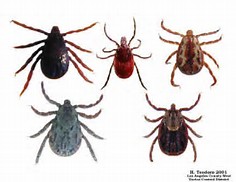 The weather is getting warmer and our minds are turning toward fun outdoor activities this time of year. Our furry friends tend to spend much more time outside as well, raising our concern for “buggy†encounters. While warmer weather does bring an increase in insect activity, truth be told fleas, and more importantly, potentially fatal ticks are a concern year round. Year-round prevention is mandatory to prevent tick-borne disease. Ticks actively seek a blood meal when temperatures exceed 40 degrees Fahrenheit, leaving you and your pet at risk. With the extreme jump in tick-borne diseases in our area, we must change our thinking about tick prevention and tick-borne diseases. The number of diagnosed Lyme cases has skyrocketed in the states of Pennsylvania and West Virginia.
The weather is getting warmer and our minds are turning toward fun outdoor activities this time of year. Our furry friends tend to spend much more time outside as well, raising our concern for “buggy†encounters. While warmer weather does bring an increase in insect activity, truth be told fleas, and more importantly, potentially fatal ticks are a concern year round. Year-round prevention is mandatory to prevent tick-borne disease. Ticks actively seek a blood meal when temperatures exceed 40 degrees Fahrenheit, leaving you and your pet at risk. With the extreme jump in tick-borne diseases in our area, we must change our thinking about tick prevention and tick-borne diseases. The number of diagnosed Lyme cases has skyrocketed in the states of Pennsylvania and West Virginia.
Consider the following data from the Companion Animal Parasite Council in WV and PA, as well as in our two most local counties:
| 2016 | 2012 | |
| West Virginia | 2165 (1 in 15 tested) | 1015 (1 in 20 tested) |
| Monongalia County, WV | 236 (1 in 20 tested) | 40 (1 in 43 tested) |
| Pennsylvania | 41,067 (1 in 8 tested) | 23,508 (1 in 8 tested) |
| Fayette County, PA | 283 (1 in 13 tested) | 20 (1 in 13 tested) |
As you can see Lyme disease is on the rise. Along with Lyme disease we are also seeing more Anaplasmosis and Ehrlichiosis in our area. There is some good news. We do have some very effective flea and tick products at our disposal. There is a product for every pet and client preference. Some suggestions are newer oral flea and tick preventatives such as Nexgard, Simparica and Bravecto. Effective topical choices (which include repellant properties) are Advantix and Vectra3D. A long lasting Seresto collar is also an option. Unfortunately ticks can still be seen and can even attach with these products being utilized. The good news is that in the estimated 24-48 hours it takes for disease transmission to occur, the tick should die. Lyme vaccination is also a strong recommendation here at CLAH. This vaccine protects against missed monthly prevention but should not be considered as a substitute for tick prevention. Any further questions or concerns can be discussed with your veterinarian.
~Chuck Wolfe, DVM







